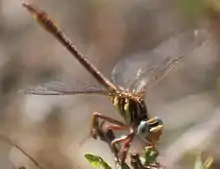Phanogomphus cavillaris
Phanogomphus cavillaris, the sandhill clubtail, is a species of clubtail dragonfly endemic to the Southeastern United States, found from Central Peninsular Florida to Southern Alabama as well as some of North Carolina.[1] Adult individuals are found in scrub-like or other dry, sandy, lightly vegetated habitats located near a stream or lake.[1] Just like most other gomphids, the sandhill clubtail has an enlarged end of the abdomen as well as eyes located farther apart than the average Anisoptera.
| Phanogomphus cavillaris | |
|---|---|
 | |
| A sandhill clubtail (ssp. P. c. cavillaris) in West Palm Beach, FL. | |
| Scientific classification | |
| Kingdom: | |
| Phylum: | |
| Class: | |
| Order: | |
| Family: | |
| Genus: | |
| Species: | P. cavillaris |
| Binomial name | |
| Phanogomphus cavillaris (Needham, 1902) | |
Description and identification

Overall, the sandhill clubtail has a very similar coloration to most other phanogomphids, a combination of yellow and dark patterning. The general patterning, as well as habitat preference, is nearly identical to the cypress clubtail (P. minutus). P. cavillaris has a straight occiput line (the line in between the eyes near the back of the head) and a dark band across the face, whereas P. minutus has a slightly curved occiput line that is lobed on the sides and an entirely pale yellowish face.[1] While there are other morphological and microanatomical differences between the two, the shape of the occiput line is most useful in the field.[1]
Subspecies
There are two subspecies of sandhill clubtail, both of which are found in Southeastern North America.
- Phanogomphus cavillaris cavillaris - The type subspecies. Found in Peninsular Florida north of Lake Okeechobee[1] as well as one slightly isolated population in West Palm Beach.[2] Roughly the same shade of yellow throughout the body and the color on the tip of the abdomen being a dull yellowish or brownish color.
- Phanogomphus cavillaris brimleyi - Brimley's clubtail - Found in Florida Panhandle, Southern Alabama, as well as an extremely isolated population in Bladen County, North Carolina.[1] Yellow on the tail much brighter and more noticeable than on the rest of the body.
References
- Paulson, Dennis (2011). Dragonflies and damselflies of the East. Princeton: Princeton University Press. ISBN 978-1-4008-3966-7. OCLC 758374336.
- "Sandhill Clubtail (Phanogomphus cavillaris)". iNaturalist. Retrieved 2021-02-23.